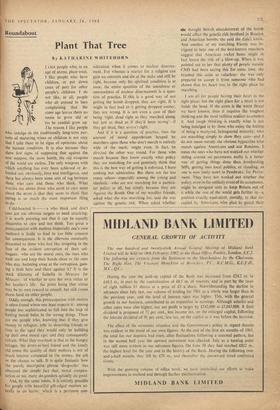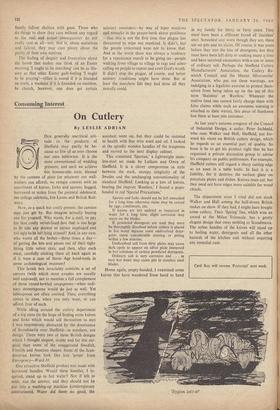Roundabout
Plant That Tree
By KATHARINE WHITEHORN
I LIKE people who, in an age of atoms, plant trees. I like people who have children, or put down cases of port for other people's children. I do not like, at all, people who sit around in bars complaining that the atom age leaves them no room to grow old or (to be candid) grow up. The reason I like people Who indulge in the traditionally long-term pur- suits of maturing wines or children is not only that I take these to be signs of optimism about the human condition. It is also because they show few signs of supposing that against the new weapon, the atom bomb, the old weapons of the world are useless. The only weapons with Which anything has ever been achieved or de- fended arc, obviously, love and intelligence, and there has always been some sort of tug between those who care and those who think. What worries me about those who seem to care most about the atom is that they seem to think that caring is so much the most important thing to do.
Cold-hearted -s who think and don't Care are too obvious .targets to need attacking: it is worth pointing out that it can be equally disastrous to care and not think. Too great a Preoccupation with motives (especially one's own motives) is liable to lead to too little concern for consequences. It is the dilemma constantly Presented to those who feel like resigning in the face of the evident corruption of their col- leagues: who are the moral ones, the ones who walk out and keep their hands clean or the ones Who stay, battering away at the corruption, gain- ing a little here and there against it? It is the stOck dilemma of Isabella in Measure for Measure: of whether to save her own virtue Or her brother's life:. the point being that virtue may be its own reward to oneself, but still comes damn hard on other people.
Oddly enough, this preoccupation with motive is often found where one least expects it: among People too sophisticated to fall into the trap of finding moral balm in the wrong things. These are the people who, knowing that if they give money to refugees, jobs to deserving friends or time to the aged they would only be building up their own moral ego; and they consequently refrain. What they overlook is that to the hungry refugee, the down-at-heel friend and the lonely old crone the quality of their motives is not of much interest compared to the money, the job or the chance to talk. It is quite fantastic how the purely descriptive phrase 'do-gander' has obscured the simple fact that, moral compen- sation or no, many do-gooders actually do good.
And, by the same token, it is entirely possible foi' people with beautiful gilt-edged motives ac- tually to do harm: which is a pertinent con- sideration when it comes to nuclear disarma- ment. For whereas a martyr for a religion can gain no converts and die at the stake and still be right, because only his spiritual condition is at issue, the entire question of the soundness or unsoundness of nuclear disarmament is a ques- tion of practics. If this is a good way of not getting the bomb dropped, they are right. If it might in fact lead to it getting dropped sooner, they are wrong. It is not even a case of their being 'right, dead right as they marched along, but just as dead as if they'd been they get dead, they weren't right.
And if it is a question of practics, then the amount of moral opprobrium heaped by marchers upon those who don't march is entirely wide of the mark; might even, in fact, be directed the other way round. For those who march because they know exactly what policy they are marching for and genuinely think that this is the best way of getting it enforced, I have nothing but admiration. But there are far too many others—especially among the young and idealistic—who are not marching for a particu- lar policy at all, but siMply because they are Against the Bomb. One of my woollier friends, asked what she was marching for, said she was against the genetic risk. When asked whether she thought British abandonment of the bomb would affect the genetic risk involved in Russian and American bombs, she said she didn't know. And another of my marching friends was in- trigued to hear one of the best-known marchers suggest that American rocket bases might in fact lessen the risk of a blow-up. When it was pointed out to her that plenty of people outside CND had been saying this for some time, she brushed this aside as valueless: she was only prepared to accept it from someone who had shown that his heart was in the right place by marching.
I am all for people having their heart in the right place; but the right place for a heart is not inside the head. lithe atom is the worst threat we have known, then it requires the toughest thinking and the most ruthless realism to combat it And tough thinking is exactly what is not being indulged in by those who enjoy the feeling of being a martyred, beleaguered minority; who are marching simply to show they care--and do not mean merely the obvious hypocrites who march against Americans and not Russians. I mean the ones who have not worked out whether sitting around on pavements really is a better way of getting things done than bombarding MPs, getting into local politics, or standing. as one is now only now) in Pembroke, for Parlia- ment. They have not worked out whether the policy, even in the unlikely event of its acceptance, might be designed only to .keep Britain out of it while the rest of the world gets farther'il—a position exactly equivalent, morally, to that oc- cupied by Americans who plan to guard their family fallout shelters with guns. Those who do things to show they care without any regard to the real and actual consequences do not really care at all—not, that is, about mutations and fallout; they may care plenty about the purity of their own motives.
The feeling of despair and frustration about the bomb that makes one think of an Easter morning 'I ought to be marching' can be as illu- sory as that other Easter guilt-feeling 'I ought to be praying'—either is sound if it is founded on truth, a washout if it is founded on emotion. In church, however, one does get certain salutary reminders—by way of leper windows and remarks in the prayer-book about pestilence —that this is not the first time that plague has threatened to wipe out mankind. It didn't, but the people concerned were not to know that. And at the worst there was always a tendency for a repentance march to be going on—people walking from village to village in rags and ashes calling on people to repent and avert God's wrath. It didn't stop the plague, of course, and better sanitary conditions might have done. But at least the marchers felt they had done all they morally could.







































 Previous page
Previous page